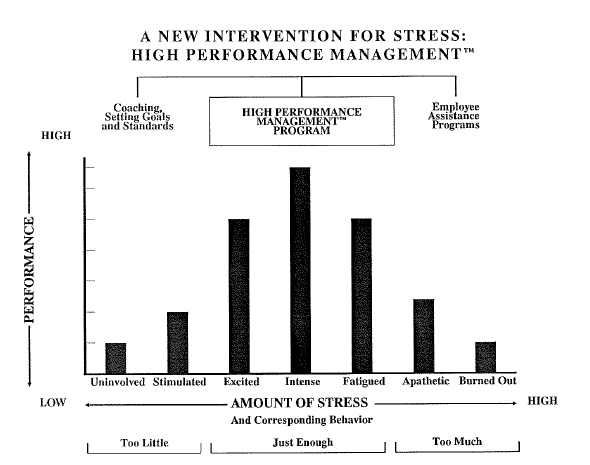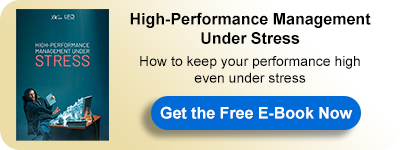Good Stress - Bad Stress
Brandon is a brilliant software engineer he was suffering from work stress during his work as a junior engineer. When Brandon became a team manager he had this idea of creating a stress-free work environment for his team. Brandon gathered his team and asked them “ what makes you feel stressed?” a lot of reasons they said, for example, tight deadlines, unclear requests, vague responsibilities, and lines of authority, when we don’t find support from people who should support us, role conflict and contradicting demands, lack of experience compared to the required tasks.
"Why those things make you feel stressed?", asked Brandon.
"Because they make us feel like we are going to fail, and if we failed we will be deprived of what we want" John answered. "Because if this happened we will be attacked by others or by management, and this will affect our image in front of others and ourselves", added Marie.
Brandon told his team that he will create a new system for high performance based on work stress elimination. As someone who suffered a lot from stress previously, Brandon wanted to remove all stressors that create fatigue, apathy, anxiety and, and may lead to burnout.
Brandon started to remove all the stressors as he mentioned in the meeting; no deadlines, or overwhelming tasks, each employee will choose tasks he wants to work on and set the deadline according to his own personal estimation.
"It is okay to make mistakes, no one will judge you and no one will hold you accountable, and this will not affect your pay or appraisal, because there will be no performance appraisal."
Brandon’s team left the meeting shocked yet happy and inspired. For the following couple of days, Brandon started to apply his new strategy, he started to remove those stressors one by one. The more stressors he removed, the more relaxed the employees become, working on tasks and projects they liked, and have more desire to try new things and get more creative. Brandon found a gradual increase in productivity.
Brandon took advantage of those findings and tried to maximize productivity more and more. He started to remove more and more stressors as he promised his team. As a result, employees became more and more relaxed, however, they didn’t seem to enjoy it very much! And shockingly their productivity started to decline. What left Brandon puzzled is that his employees didn’t seem to care much about the reduction in their productivity. They were uninvolved in the work they were doing.
Brandon headed to his manager Lilian, told her that he can’t figure out the relationship between stress and performance, he knows for sure that increased stress level reduces productivity, he experienced this before himself, and when he tried to reduce stress levels for his team it worked and their performance increased, but it was soon depleted again.
Lilian who knows a lot about resilience and managing stress asked Brandon “do you know the difference between Eustress and destress?” Brandon shook his head.
Lilian explained: "Not all stress is bad Brandon. There is good stress and bad stress."
"Destress, the bad one, is like the one you were facing when you were a junior developer, the one that made you feel overwhelmed, anxious, apathetic. This type of stress can cause physical symptoms like insomnia, eating disorders, and headaches. This type of stress is bad because it reduces productivity o the short run, and can cause chronic diseases in the long run such as blood pressure diabetes, or heart disease."
"On the other side, the elimination of stress will cause us to lose the motivation to work, if people don’t feel like they are challenged by something they will lose interest, your employees lack stimulation to work".1
"Eustress is what they need. Eustress produces positive feelings of excitement, fulfillment, meaning, satisfaction, and well-being. Eustress helps us stay motivated, work toward goals, and feel good about life".2
"Employees need to experience a moderate degree of stress, just enough to keep them engaged, excited, and challenged. Not too low so they become uninvolved and lose their excitement, and not too high so they become fatigued and burned out. This is what we call Hige Performance Management, Brandon."

"The above bar chart shows High Performance Management’s uniqueness in the Stress Management field. Starting at the left of the chart is “Too Little Stress.” This means that people are not challenged. Correspondingly, their performance is low. Here, supervision is required, and setting goals and standards with effective coaching can provide the stimulation to increase the performance level."
"On the right side of the chart, there is “Too Much Stress.” At this point, people can be overwhelmed, and as a result, performance can drop. Rehabilitation is required to correct the apathy or burnout. Employee assistance programs are being used to deal with people in this extreme State."
"But the bulk of productive employees in the center of the chart can sustain their performance — and increase it—without sliding down the performance scale. By using the tools in the High Performance Management Program to keep stress “Just Enough,” employees can remain excited and intense, performing at high levels."
"Not all stress automatically leads to negative results. Stress can be exhilarating. Many of us do our best, perform at top levels, under stress. It's only if the stress continues because of unresolved source problems that it can lead to complications. Then our stress strengths can be exaggerated and can become counter-productive."
1Hailey Shafir, Benjamin Troy, 2nd march 2021, choosing therapy, accessed 28th March 2021 https://www.choosingtherapy.com/eustress-vs-distress
2Timothy J. Legg, 3rd Jan 2019, Healthline, accessed on 28th March 2021 https://www.healthline.com/health/eustress?
For more about this topic, download our latest book "High Performance Management Under Stress" for FREE:
